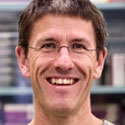Academic Editors
The following people constitute the Editorial Board of Academic Editors for PeerJ. These active academics are the Editors who seek peer reviewers, evaluate their responses, and make editorial decisions on each submission to the journal. Learn more about becoming an Editor.

Lydia Jimenez-Diaz
Principal investigator of several projects at international, national and regional level, and has participated in over 20 research projects as a partner. Currently co-director of two doctoral courses on the brain regions associated with memory storage and Alzheimer's disease. Research is focused on the molecular and cellular basis of synaptic plasticity processes in the Central Nervous System.

Maria del Mar Jimenez-Gasco
Associate Professor in the Department of Plant Pathology and Environmental Microbiology at The Pennsylvania State University. Ph.D. in Crop Protection (2001) from the University of Córdoba, Spain. M. Eng. in Agricultural Sciences and Engineering (1997)
Research interests: population genetics, phylogenetics, population biology of plant-associated microorganisms,ecology of soilborne fungi (Verticillium dahliae and Fusarium oxysporum), emergence and evolution of plant pathogenicity and virulence.

Malcolm Jobling
Professor of Fish Biology and Aquaculture. Authored and edited books on fish biology, physiology and nutrition, and aquaculture, and serving editorial board member for fisheries and aquaculture journals. Formerly, member of EUCost, ICES and academic society steering committees.

Blake W Johnson
Dr Blake W Johnson is Associate Professor of Cognitive Science and Director of Research in Hearing and Cognition at Macquarie University. Dr Johnson's research uses functional neuroimaging techniques, particularly magnetoencephalography (MEG) to investigate the neural bases of cognition and its disorders. His current work examines auditory and cognitive brain function in children using a novel paediatric MEG instrument customised to fit the smaller heads of preschool-aged children.

Magnus L Johnson
I am a marine scientist with eclectic interests including crustacean biology and fisheries, fisheries management generally, krill swimming behaviour, cleaner fish, coral reef systems, the relationship of marine commensals and their hosts and the eyes of shrimps. I work in the School of Environmental Sciences at the University of Hull where I am the Director of the MSc in Environmental Change Management and Monitoring. I am a fellow of the Marine Biological Association and a board member of the Science-Art foundation "Invisible Dust".

Michela M Johnson
I am a postdoctoral researcher at the State Natural History Museum in Stuttgart. I completed my PhD at the University of Edinburgh in 2019. My work focuses on teleosauroids, a group of semi-marine Jurassic crocodylomorphs, and aspects of their morphology, phylogenetics, taxonomy and ecology. For my postdoc I am studying their ontogeny and body size distribution during the Early Jurassic.

Sheri L Johnson
A behavioural ecologist with broad interests in sexual selection, mating system evolution, sperm biology, behavioural epigenetics, and the effects of environmental challenges (e.g., hypoxia, toxins, and microplastics) on the reproductive and behavioural ecology of animals. Study systems include marine invertebrates, marine and freshwater fishes (including zebrafish) and terrestrial invertebrates (weta and stag beetles). Overall, Dr Johnson's research programme investigates both genetic and environmental effects on behaviour and reproductive fitness.

Charles D Johnson
Dr. Johnson earned his BS and PhD from Texas A&M University, with an intermediate MS degree from Clemson University. He completed a postdoc at the University of Louisville, leading to his role as associate director of bioinformatics for the Center for Genetics and Molecular Medicine at the same institution. He played a foundational role in creating the statistics and bioinformatics division at Ambion/Asuragen Inc. Following this, Dr. Johnson founded BioMath Solutions LLC, a bioinformatics-focused startup specializing in software development for genomic technology firms.
Presently, Dr. Johnson serves as the Director of Genomics and Bioinformatics Service at Texas A&M AgriLife.

David W Johnston
Dave Johnston is a biological oceanographer and marine conservation ecologist whose research focuses on the habitat needs of marine vertebrates in relation to pressing conservation issues.

Eija Jokitalo
Research Director of Electron Microscopy Unit and Group leader of Morphological determinants of the endoplasmic reticulum –group within the Program in Cell and Molecular Biology, Institute of Biotechnology, University of Helsinki. Chair of EM Consortium, National Imaging Infrastructure Network, Biocenter Finland Technology Platform.

Christopher J. Jolly
Head of the DNA Repair Group, Centenary Institute, Sydney, Australia
Postdoctoral Fellow, MRC Laboratory of Molecular Biology, Cambridge, UK
Postdoctoral Fellow, John Curtin School of Medical Research, ANU, Canberra
PhD, Macquarie University/CSIRO, Sydney

Roger N Jones
Roger Jones is a Professorial Research Fellow at the Victoria Institute for Strategic Economic Studies (VISES) at Victoria University, Melbourne. He leads a small team who work on climate-related risk, ecological and institutional economics and research into practice. The group applies a transdisciplinary approach to understanding and managing risk that bridges science, economics and policy. Roger previously worked for Australia’s CSIRO for 13 years, developing methods for climate risk assessment. Qualified in earth science, he has worked on urban ecology, been a museum curator and technical essayist, public radio host and researcher working on past, present and future climates and their impacts. He was Coordinating Lead Author on the chapter Foundations of Decision Making in the Intergovernmental Panel on Climate Change’s Working Group II Fifth Assessment Report. He was also Coordinating Lead Author on the IPCC Fourth Assessment Report and a lead author on the Third Assessment Report.

